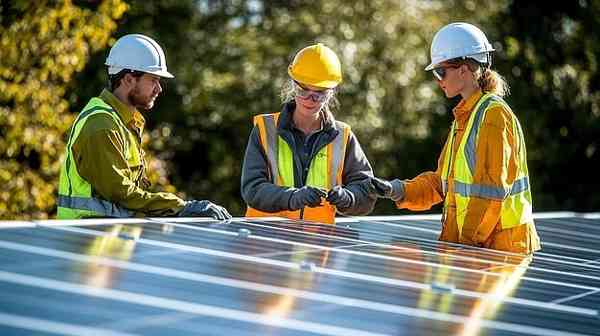什么是贝丝电池能源系统?
当您探索太阳能和能源独立的世界时, 您将不可避免地遇到首字母缩写“ Bess。" 贝丝在电池的背景下实际上是什么意思, 这与仅购买电池有何不同? 理解这个术语是欣赏现代的第一步, 智能储能.
贝斯代表电池储能系统. 这里的关键词是“系统。" 贝斯不仅是电池本身; 这是整个, 集成解决方案旨在安全,智能地存储和传递电源. 它包括电池模块, 关键的电池管理系统 (电池管理系统), 电源转换系统 (件) 或逆变器, 控制软件, 以及所有必要的安全组件. 这是一个完整的强国, 准备融入您的家庭或企业.

在 吉克斯太阳能, 我们不只是卖电池; 我们设计并安装完整的Bess解决方案. 这种整体方法可确保每个组件都可以完美地和谐,以提高效率, 安全, 和长寿. 让我们探索一些与这些令人难以置信的系统有关的热门话题.
贝斯的缺点是什么?
电池储能系统提供了强大的好处, 但是重要的是要作为一项考虑的投资. 对潜在缺点的清晰眼光有助于您理解完整的情况并做出自信的决定.
贝丝的主要缺点是 巨大的前期成本, 一个 有限的运营寿命 由于自然电池降解, 固有 往返效率损失, 这 物理空间 它需要, 和 临终回收考虑因素. 好消息是现代贝斯技术, 特别是使用LFP的系统 (铁磷酸锂) 化学, 大大提高了这些挑战并最大化长期价值.

深入潜水: 对贝斯挑战的平衡观点
让我们看一下现代解决方案的背景:
- 前期费用: 贝斯是一项重大投资.
- 我们的观点: 我们鼓励客户通过长期价值的视角查看它. 贝斯可以大大降低电费, 特别是在新加坡等高成本地区与太阳能配对时. 激励措施, 在哪里可用 (像美国联邦ITC), 也可以削减初始成本. 它在停电期间的价值是不可估量的.
- 有限的寿命: 电池随着时间的推移和使用而降级.
- 我们的观点: 这是技术选择至关重要的地方. 我们优先考虑LFP电池, 有很长的寿命 10-20 年和 3,000-6,000+ 周期, 由强大的10年保修支持. 这确保了贝斯是长期资产.
- 往返效率损失: 你没有 100% 您投入的能量.
- 我们的观点: 虽然某些能量随着热量而损失, 现代LFP BES高效, 往返效率通常在 85% 和 95%. 选择正确的系统设计 (就像DC耦合一样, 我们将讨论下一个) 可以进一步优化.
- 物理足迹: 贝斯单元需要空间.
- 我们的观点: 现代设计,例如光滑的壁挂电池和紧凑型, 可堆叠的机架安装系统是高空高效的, 特别是与他们提供的能力相比. 我们帮助客户找到最佳的位置安全且不引人注目.
- 环境/回收: 电池制造具有环境影响, 生命后的管理是一个有效的问题.
- 我们的观点: 我们喜欢LFP化学,因为它避免了钴, 具有重大道德和环境问题的矿物. 此外, 全球电池回收行业正在迅速发展,为这些有价值的材料创造了更循环的经济.
更好的是Bess DC或AC?
与太阳能电池板系统集成在一起时, 您会遇到一个关键的技术选择: 应该与DC耦合或交流耦合? 这是指电池系统如何连接到您的太阳能电池板和房屋. 哪一个是“更好" 完全取决于您的特定情况和目标.
都不是“更好”," 但是它们在不同情况下具有明显的优势. A DC耦合的Bess 一般是 更有效的新, 集成的太阳能储存安装 因为太阳能电池板的直流电源可以直接为直流电池充电,而无需额外的转换. 一个 交流耦合的贝斯 经常 更容易,更具成本效益的改装到现有的太阳系上 因为它与自己的逆变器独立运行.

深入潜水: 了解AC和DC耦合
让我们分解两个架构:
- 交流耦合系统:
- 它如何工作: 您的太阳能电池板连接到他们自己的太阳逆变器 (将直流转换为AC). 你的贝斯有 自己的 单独的电池逆变器. 两个逆变器都连接到您家的主交流电动面板. 从太阳能充电电池, 太阳逆变器的交流电源必须转换 后退 电池逆变器到DC.
- 优点: 非常灵活. 易于添加到已经具有网格柱太阳系的任何房屋中,而无需更换现有的太阳逆变器.
- 缺点: 额外的电源转换步骤 (太阳能DC-> AC-> 电池直流) 导致稍低的往返效率.
- DC耦合系统:
- 它如何工作: 您的太阳能电池板和电池库都直接连接 (在DC侧) 一个, 复杂的 混合逆变器 或与逆变器配对的太阳电荷控制器. 这个设备管理面板之间的能量流, 电池, 和您的家/网格.
- 优点: 效率更高. 太阳能电池板的直流电源可以直接为您的直流电池充电, 跳过效率低下的DC到AC-AC-DC转换步骤. 这意味着您更多的宝贵太阳能将其输入电池. 这通常是新安装的首选设置.
- 缺点: 需要一个特定的 (有时更昂贵) 混合逆变器. 如果要替换原始太阳逆变器,则将添加到现有太阳系中可能更为复杂.
适合你的? 在GYCX太阳能, 我们设计两个. 如果您有现有的太阳系,并且想添加存储, 交流耦合贝斯通常是最简单的路径. 如果您一起安装全新的太阳能和存储系统, DC耦合解决方案通常是最有效,最优雅的选择. 我们分析您的特定情况以推荐最佳体系结构.
BMS是否停止充电?
关于任何高级电池系统的一个常见和重要的问题是,阻止它通过连续充电损坏的原因. 系统知道何时停止吗?
是的, 绝对地. 的主要和关键功能 电池管理系统 (电池管理系统), 与主系统充电器合作 (PC或太阳电荷控制器), 是 电池达到完整且安全的电压极限时停止充电过程. 这是一项基本安全功能,可防止过度充电并保护您的电池投资.

深入潜水: 两层安全协议
将其视为两层保护系统:
- 充电控制器 / 逆变器 (经理): 这是管理电荷的主要设备. 它遵循针对电池化学编程的特定充电配置文件 (例如, 磷酸铁锂). 它可以监视电池的电压和, 当它到达目标时“" 电压 (“吸收的末端" 阶段), 它将停止将大电流推入电池. 本质上说, “好的, 工作完成了。"
- BMS (监护人): 这是最终的安全层, 直接监视电池电池的健康. 它对每个电池电压都有自己的独立看法. 如果, 出于任何原因, 主要充电器是故障或试图推太多电压, BMS有权干预. 当它检测到任何电池已经达到其绝对最大安全电压时, 它将命令充电器停止,并, 如果需要的话, 甚至可以打开内部继电器或接触器,以物理断开电池的连接.
这个聪明的, 多层方法使现代贝丝如此安全可靠. 您不必担心“拔掉" 您的系统; 它完美地管理.
您可以用BMS过度充电锂电池吗?
您知道BMS在那里保护电池, 但是它的万无一失? 即使它具有 电池管理系统1. ?
任何人 正常运行, 认证的贝斯, 这是 几乎不可能向锂电池充电. 整个系统, 凭借其多余的保护层 (主要充电控制器和BMS), 专门为防止这种情况而设计. 一次过度充电事件只能发生在灾难性的不太可能的情况下, 两个外部充电控制器的同时失败 和 内部BMS安全电路. 这就是为什么选择高质量的原因, 认证设备非常重要.

深入潜水: 为什么认证的系统是安全的
由于这些原因,在专业系统中有效消除了过度充电的风险:
- 冗余保护: 如上所述, 您有两个独立的系统 (逆变器/充电器和BMS) 监视费用. 为了发生危险的过度充电, 两者都需要以非常特定的方式同时失败.
- 严格的安全标准: 信誉良好的Bess产品不仅是建造的; 他们经过严格的测试并获得了严格的安全标准的认证 UL 9540 (储能系统和设备标准) 和 UL 1973 (用于固定应用的电池标准). 此认证过程验证了组件, 包括BMS及其安全功能, 按照打算防止危险等危险一起工作.
- 故障安全设计: BMS设计为故障设备. 当它检测到关键故障时,其默认状态是保护电池, 这通常意味着断开连接.
- 真正的风险: 在世界上,收费过度的风险是非常真实的 DIY电池组或使用便宜时, 未经认证的组件. 一个没有BMS的电池组制造不良, 或与电池化学不兼容的不匹配的充电器, 创建一个非常危险的情况,使超额充电是一种明显的可能性.
GYCX太阳能故事: “这就是为什么GYCX太阳能专门与已建立的Bess制造商合作,其产品已获得国际安全标准的全面认证. 我们了解他们背后的工程, 我们的承诺是为客户提供安全性不仅仅是功能的系统, 这是整个设计的基础。"
所以, 贝丝是什么意思? 这意味着完整, 聪明的, 和安全的能源系统. 虽然有一些因素,例如成本和寿命, 现代贝斯技术提供了令人难以置信的优势. 通过了解AC VS等关键概念. DC耦合和BMS的关键安全作用, 您可以欣赏这些系统带来的价值.
如果您准备探索电池储能系统如何为您的家庭或企业提供能源安全和储蓄, GYCX太阳能团队在这里提供帮助. 我们有专业知识来回答您的问题并为您设计完美的解决方案. 立即联系我们!
了解BMS的概念将帮助您更好地比较和理解与电池相关的数据概念. 这将帮助您选择最适合我们公司需求的产品. ↩
